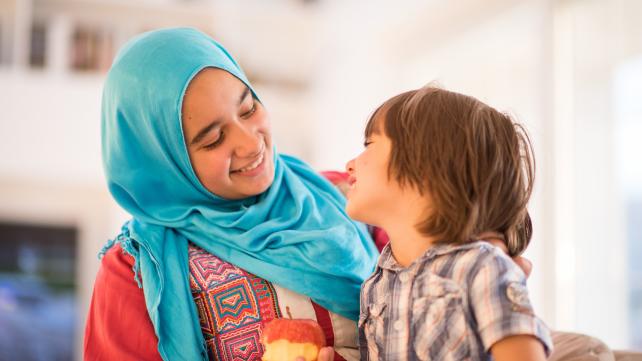
As we become parents, one of the greatest challenges that we have is raising our children to be good Muslims. My wife and I are Muslim converts and have made it our mission to expand our knowledge and understanding of this beautiful religion. We also come from Latin American countries where Islam is still in its early stages and we often stress about the lack of resources in our language. No matter these or other challenges, we must strive to teach our children about Islam and find ways to do so effectively. This is the case for all of us, no matter our background or how grounded in our faith we may be.
Our Responsibility to Teach about Islam
Allah says in the Quran:
“O you who have believed, protect yourselves and your families from a Fire whose fuel is people and stones.”
(Surah Tahreem, 66:6)
We have a responsibility as parents to protect our families as much as we possibly can, inshaAllah, by Allah’s will. The way to save them from the torment is to exhaust our efforts in teaching them about Allah, to worship him, and live a life as an upright Muslim.
Abdullah ibn Umar reported that the Messenger of Allah, peace and blessings be upon him, said:
“Every one of you is a shepherd and is responsible for his flock. The leader of people is a guardian and is responsible for his subjects. A man is the guardian of his family and he is responsible for them. A woman is the guardian of her husband’s home and his children and she is responsible for them. The servant of a man is a guardian of the property of his master and he is responsible for it. No doubt, every one of you is a shepherd and is responsible for his flock.”
Teaching our youth starts with us at home. Their Islam, their submission to Allah, will be a result of first Allah’s Mercy, then our prayers, our level of commitment to Islam, and our example. We must be the shepherd for our families and lead by example, just as the Prophet Muhammad, peace and blessings be upon him, is an example for us.
I say by Allah’s Mercy because, as parents, we also need to understand that guidance is in the Hands of Allah. We are simply here to pass the message through our actions, example, and love to our children. Ultimately it is Allah that guides. Given the current state we are in, we have a unique opportunity to be, more than ever, that example for them, to be the leader, teacher, and nurturer our children need and deserve.
As Allah says in the Quran:
“There has certainly been for you in the Messenger of Allah an excellent pattern or example.”
(Surah Al-Ahzab, 33:21)
Just like we have a beautiful example and role model in our Messenger, we should also be an excellent role model for our children. Therefore, it is important to start with our own selves above all else.
Important Lessons
There are two simple points to continuously teach and remind our children. It does not require us to have a high level of knowledge or be an ‘alim or Islamic scholar. Abdullah ibn Amr reported: The Prophet, peace and blessings be upon him, said,
“Convey from me, even a single verse.”
(Bukhari, 3274)
1. Remind them about the basics.
Allahu rabbi, wa Muhammad an-nabi, wal Islam deeni, wal Quran kitaabi.
Allah is our Lord, Muhammad is our Prophet, Islam is our way of life, and the Quran is our book (of guidance). Constantly sharing and reminding them of this simple phrase is a way to keep their hearts connected to Allah.
There was an incident that occurred during the life of the Prophet, peace and blessings be upon him that is relevant here. Mua’wiyah ibn al-Hakam As-Sullami reported that:
“I said, ‘O Messenger of Allah, I have a servant-girl whom I slapped.’ That upset the Messenger of Allah, peace and blessings be upon him. I said to him, ‘Shall I emancipate her?’ The Prophet said, ‘Bring her to me.’ Then, she was brought, and the Prophet said, ‘Where is Allah?’ She said, ‘In heaven.’ The Prophet said, ‘Who am I?’ She said, ‘You are the Messenger of Allah.’ The Prophet said, ‘Free her, for she is a believer.’”
(Muslim)
From this hadith we learn that we should teach children the fundamentals of Islam, testing them, asking them questions, and instilling its significance in their minds and hearts. This teaching should be enveloped in mercy and kindness. This method is the way the Prophet, peace and blessings be upon him, and his companions taught their children.
Islam should always be a positive aspect of our lives; it should never be a punishment. We should never use the teachings of Islam to oppress our children, lest they grow to detest it and turn away from guidance. Allah should be the center of our children’s lives. All our actions should be based on Islam and we should stress how special that is. The way we live, eat, sleep, enter the bathroom, leave our homes, treat others, conduct business – everything is based on Islam. As parents we must explain the beauty in our way of life and how it shapes our Muslim identity in a positive way.
2. Teach them how to be good Muslims.
All of us want our children to be the best they can be – hufadh of Quran, memorizers of ahadith, callers to Allah; some of us want them to become doctors, lawyers, engineers, etc. We have these lofty goals for our children, but what we should want the most for them is that they be good Muslims, good people.
I was discussing with my children the other day the importance of being a good person. No matter how much Quran or hadith we memorize or how many books we read, the essence of our faith is having good character. That is teaching our children empathy and compassion, teaching them to be well-mannered and emotionally aware. This is important for us, as well, because sometimes we feel like we are not learning or memorizing as we should. We sometimes feel stuck, but our manners and compassion are also acts of worship.
Abdullah ibn Amr reported that the Messenger of Allah, peace and blessings be upon him, said:
“Whoever would love to be delivered from Hellfire and admitted into Paradise, let him meet his end with faith in Allah and the Last Day, and let him treat people as he would love to be treated.”
(Muslim)
Some Simple Strategies
There are several ways we can go about sharing and teaching our children about Islam. The first, as I mentioned is being a good example, but here are a few others:
- Be a good example.
- Focus on our own learning and understanding.
- Give them the tools they need to learn.
- Provide them with a healthy, positive environment.
- Have story time with them.
- Test them and give frequent reminders.
- Plan activities that connect them to our faith.
- Play games and have fun with them.
- Keep them close to the Islamic community,
- Use available resources.
A Witness for Us
Our children are our future. They will bear our torch and pass it along to their children, and so on. They will succeed us and inherit our strengths and weaknesses. What kind of example do we wish for them to carry into the future?
On the Day of Judgement, they will be a witness for us or against us. The Messenger of Allah, peace and blessings be upon him, said,
“Indeed a man may ascend a level in Paradise and ask, ‘How did this happen?’ So, it will be said to him, ‘By your child asking forgiveness for you.’”
(Ahmad and ibn Majah)
There are countless benefits for raising righteous children, which should motivate us to strive for their wellbeing and teach them about Islam. Always pray for them. Keep them constantly in your duas, asking Allah to guide them and their progeny. This was the way of the Prophets. As Allah mentions in the Quran, we offer the prayer of Prophet Zakariyya, peace be upon him, when he called out saying,
"My Lord, grant me from Yourself a good offspring. Indeed, You are the Hearer of supplication."
(Surah Al-Imraan, 3:38)
May Allah grant us righteous offspring who will raise us in our ranks in the Hereafter. Ameen.
Hernán Guadalupe embraced Islam in 2001 while earning a Bachelor of Engineering at Stevens Institute of Technology. He holds a Masters degree from the University of Maryland, and a Doctor of Business Administration from Walden University. Hernan has studied Islamic sciences at the American Open University, University of Mishkah, and is currently completing his Bachelors in Islamic Studies. He also completed the classical Arabic curriculum at the Fajr Center for the Arabic Language in Cairo, Egypt. He is the co-founder of Hablamos Islam, a non-profit outreach program dedicated to creating educational resources about Islam in Spanish. He lives in Maryland with his wife and six children.








Add new comment